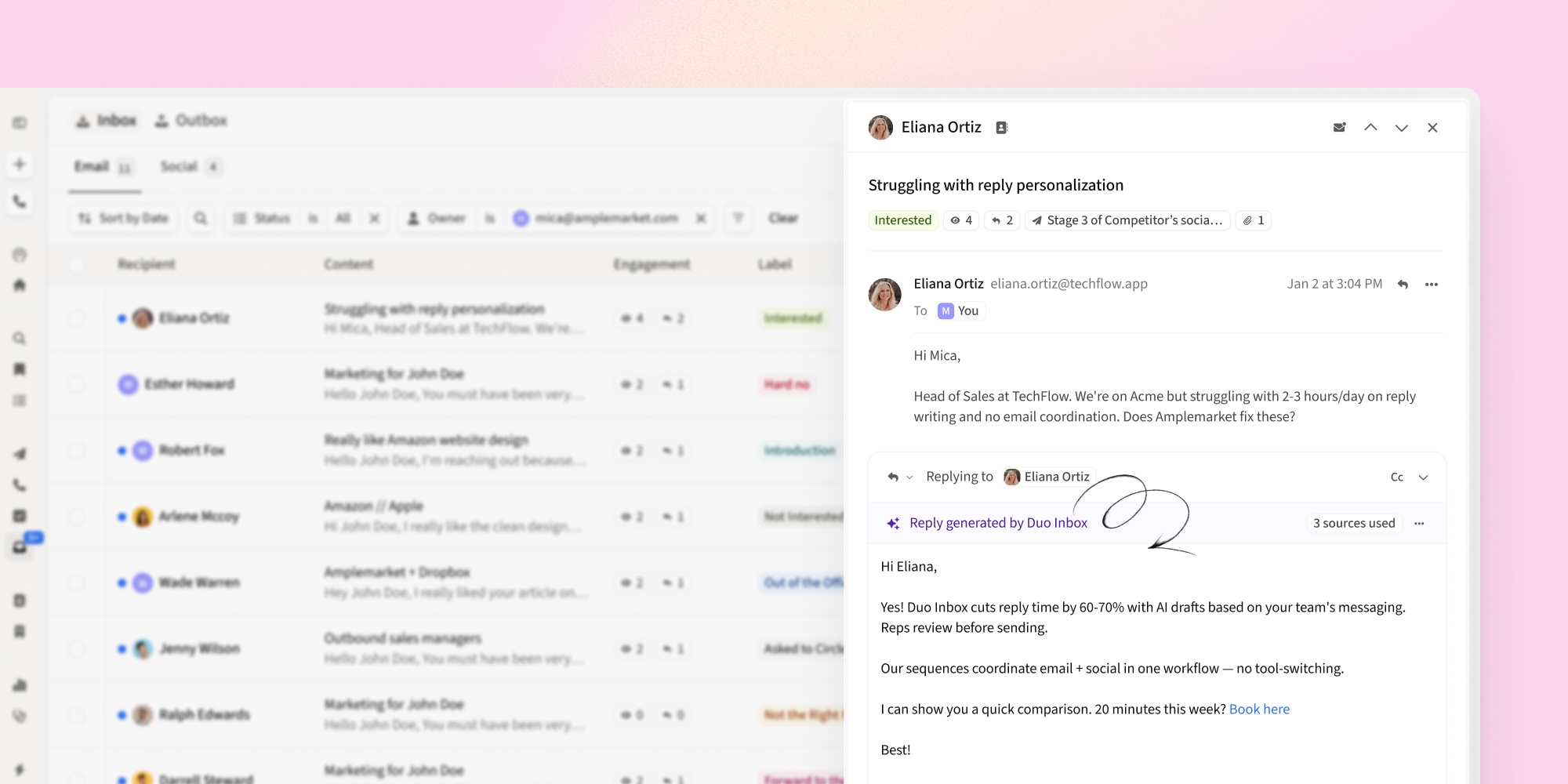How to clone a voice: beginner's guide to AI voice cloning
.jpg)
Discover the tools, steps, and best practices for creating realistic AI voice clones to boost your sales and outreach!
You’ve heard of AI that writes cold emails like you. But what about AI that sounds like you?
AI is great for helping you create the value-driven, hyper-personalized outreach that your prospects resonate with – and for doing so at scale. Just as an AI Copywriter can multiply your cold emailing efforts, AI Voice Cloning can help you amplify your outbound voice messages!
Let’s explore the basics of voice cloning, how to clone your voice using AI, and how it can boost your outbound productivity. By the end of this blog, you’ll know everything you need to know to add a new layer of sophistication to your multichannel outreach.
Introduction to AI voice cloning
What is AI voice cloning?
AI voice cloning is a technology that uses artificial intelligence to replicate a person's voice. In the rapidly evolving field of AI, voice cloning has become an essential tool for many industries.
The AI analyzes samples of your voice to understand your speech patterns and create a digital version that sounds just like you.
This technology is evolving rapidly and can be used in various applications, from personalized customer interactions to scalable sales outreach.
The evolution of voice cloning technology
Voice cloning technology has already come a long way. Early voice cloning models required extensive manual input and were limited in their capabilities.
Today, with advancements in AI and machine learning, voice cloning is more accurate, convincing, and accessible. This improvement in quality means voice replication tools are being integrated into real-time communications and automation processes.
How AI voice cloning works
Understanding the basics of voice replication
Essentially, voice replication involves capturing the unique characteristics of your voice, including everything from tone, to pitch, to tempo and speaking style. This process typically involves training the AI on a variety of voice samples to ensure it captures all the nuances of the your voice across different phonetic sounds.
The AI then applies all your voice characteristics to generate new audio that mimics your original speech patterns.
To clone a voice, the AI system requires a significant amount of high-quality audio data to accurately replicate the unique vocal traits.
An advanced AI voice replicator can capture the nuances of your speech, creating a digital version that sounds just like you.
Tools and software for voice cloning
There’s now a huge range of AI voice cloning tools and software solutions to choose from depending on your use case.
These range from basic voice cloning apps to advanced, purpose-built platforms like Amplemarket, which offer features such as AI Voice Cloning for automated voice message creation and integration into sales sequences.
In the case of Amplemarket, AI Voice Cloning helps to enhance your productivity, because, like an AI copywriter, it saves you valuable time on manual message creation and allows you to scale your prospect engagement more efficiently.
Choosing the right AI voice cloner is crucial for achieving the most accurate and realistic voice replication possible
Step-by-step guide to cloning a voice in Amplemarket
Preparing to clone a voice: what you need to know
The first step of cloning your voice is the record your speech for replication.
One of the most effective ways to do this is to read a specific script that provides the AI with plenty of data to work from. When you’re ready to record, make sure you’re in a quiet setting to get a clean and clear sample.
Once you've created your voice clone, you can seamlessly integrate it into your outreach strategies to personalize your communications.
Detailed process: how to clone a voice with AI in Amplemarket
To set up your AI Voice Cloning in Amplemarket, make sure you’re logged in to the desktop app. Then:
1. Click on “Settings” in the bottom left corner or your screen and select the “AI Voice Cloning” tab.

2. You can then follow the instructions on screen to record a sample of your voice. You’ll find pre-prepared scripts (in the style of an outbound voice message) that will help the AI map your speech patterns for replication.

3. Record your samples and replay to check you’re happy with the result. You can re-record as many times as needed.
4. Once your recording is ready, submit it for processing. This may take a few minutes!
5. When your cloned voice is ready, a short audio preview will appear for you to check out.
6. If you’re happy with the result, you can start integrating your cloned voice into your outbound sequences!
7. If you’re not quite happy, you can choose to replace the existing sample or delete all your voice cloning data completely.
Best practices for high-quality voice clones
To achieve the best results with your AI voice clone, we recommend you follow these tips:
- Be mindful of your surroundings: Ensure your voice recordings are clear and free from background noise.
- Check before you submit: Replay your voice sample before you submit to make sure it’s a true representation of how you’d normally speak.
- Be natural: It sounds obvious, but your sample needs to be an authentic and accurate representation of your voice if the clone is to sound convincing! Try not to speak faster or slower than you would normally, and make sure you inflect and show expression as you would if you were talking to someone in person.
Ensuring a clear and natural recording is key to producing a high-quality AI voice clone that can effectively mimic your original speech patterns
Common uses of AI voice cloning
Applications in sales and outreach
AI voice cloning is amazingly useful in sales for automating your prospect outreach!
For instance, you can use cloned voices to send personalized voice messages at scale, making your sales efforts more efficient and engaging. With Amplemarket, you can schedule and automate these messages in advance, saving you time and increasing your reach. All you have to do is create a message script, and your voice clone will take care of the rest.
AI voice cloning can also enhance your outreach on platforms like LinkedIn, where you can use LinkedIn voice messaging to deliver personalized audio messages at scale.
Personalized AI assistants and customer service
In customer service, AI voice cloning can be used to create personalized AI assistants that respond in a voice similar to a brand’s representative. As in sales outreach, this helps ensure the customer experience always feels authentic, human, and personal.
The future of AI voice cloning
AI is transforming how we communicate and interact in the digital age. At the same time, sellers are looking for creative and memorable ways to win their prospects’ attention, so it only makes sense that sales teams tap into AI tools like voice cloning to make their engagements more engaging.
As voice cloning technology continues to advance, its applications in various sectors will keep expanding and offering even more possibilities for personalized communication.
Interested in seeing how you could use voice cloning in your outbound? Sign up for an Amplemarket demo today!
FAQs on how to clone a voice
How does voice cloning work?
Voice cloning involves gathering audio samples from the individual you wish to replicate, inputting them into a neural network, and then analyzing the audio to mimic the person’s voice. After the machine is trained, it can produce new audio that closely resembles the original voice.
How do you replicate a human voice?
AI voice cloning, sometimes referred to as voice synthesis or voice mimicry, leverages machine learning to replicate a particular person’s voice. It requires a collection of voice samples to study and understand the distinct vocal traits of the individual.
How much audio do you need to clone a voice?
Cloning technology has become so advanced that you no longer need to submit hours of audio samples. Amplemarket's AI Voice can clone your voice with just 2-3 minutes worth of samples!
Is voice cloning legal?
The main legal issue with AI-generated speech revolves around consent. Using someone’s voice without their explicit permission can result in significant legal consequences, including lawsuits for violating personal rights, privacy breaches, and the risk of misuse for fraudulent purposes.
Subscribe to Amplemarket Blog
Sales tips, email resources, marketing content, and more.










